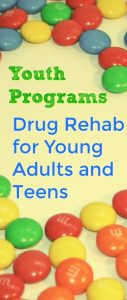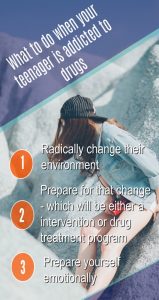Special youth programs are available for specialized recovery needs. Youths 12-17 frequently turn to drugs and alcohol to self-medicate treatable mental disorders. Where it is estimated that 10% of the U.S. population is predisposed to alcohol abuse it is also estimated that 20 percent of adolescents in the country suffer from a serious mental disorder that inhibits their ability to function. An unfortunate trend is the increased use of drugs with young adults age 18-27. If you listen to the news, you most likely have heard about the opioid epidemic.
Studies have proven that there is a correlation between drug use and mental disorders, with 90 percent of suicides involving substance abuse. Fortunately, there are now Youth Programs that offer treatment to adolescent males and females between 12 and 17 for addiction, mental health, and co-occurring conditions. There are also young adult programs that specialize in treating people age 18-27.
Traditional alcohol and drug rehab programs tend to treat everyone the same way. Young adults are often relapse-prone and have unique issues and triggers that require specialized treatment. To address these challenges, we work with unique programs for young adults to address their particular issues and empower them to successfully transition into adulthood.
After a thorough assessment of each young adult or teen, we can suggest a customized program to best treat them for their specific problem.
How long will my young adult be in treatment?
The time of the program depends on the individual needs of the participant. After your teen or young adult has been assessed by the staff, they will determine the length of their treatment program. Most residential treatment program for adolescents are a minimum of 30 days. However, many patients stay 90 days or longer. Patients need time to work through their issues gradually. There is no way to rush the treatment process. Remember treatment will continue even after they leave.
Are Youth Programs Safe?
Yes. Your young adults’ safety is a top priority. To make sure that your child is safe, most facilities have cameras and electronic systems installed throughout the facility. Staff and medical personnel are typically monitoring who is leaving and entering the treatment center 24/7.

Changing Environments
Keep in mind your young adult’s’ special needs. Recent studies show that young adults suffering from addiction, typically have other problems going on at the same time. They are going through big life changes, and tend to have high levels of peer pressure. For example, addiction is listed as one of the top five mental health problems facing college students. This doesn’t surprise most people, as these young adults are exposed to new responsibilities. Experiencing a change in settings and people all at once can be overwhelming. It’s important to understand the priority of flexibility in meeting the therapeutic needs of these participants. They will learn to navigate their constantly changing social environments.
Preparation
To prepare participants to meet their life challenges, young adult addiction programs will normally offer care for individuals with addictive and co-occurring disorders. The recovery approach to treating addiction combined with emotional and physical problems is unique for each person. Young adult addiction treatment patients and their families participate in groups designed to help them explore their problems. They will also need to talk about the impact this has on the family.
Family Support
Families are essential to the recovery process. Our experience shows that when family members work together, negative habits can be broken. It’s possible to change bad patterns. There is an opportunity to learn ways to improve relations and better self-care The goal is to help rebuild crucial support systems for patients. Families can help with this process by:
- Being Present – listening and offering support
- Treating their loved ones as whole human beings
- Accepting mental health issues
- Believing they can recover
- Building on their strengths
What are the effects of drug addiction on Young Adults and Teens?
The effects of drug addiction include:
Poor health
Weak immune system
Cardiovascular conditions
Nausea, vomiting and abdominal pain
Liver damage or failure
Seizures strokes and widespread brain damage

Injuries
Accidents
Risk of domestic violence
Medical problems
Death
Behavioral problems
Paranoia
Aggressiveness
Hallucinations
Impaired Judgment
Impulsiveness
Loss of Self-Control
Toxic relationship with loved ones
Drug addiction can lead to a number of mental and physical disorders. If the addiction is left untreated, drug use will continue. It will actually get worse over time. This is true, despite its overwhelming and demoralizing consequences on individuals and their families. When addicts recognize their unhealthy state – and witness the impact their drug use their options open. We have seen so many families get better.